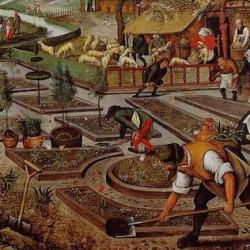Brad Gregory (Unintended Reformation, 268-9) observes that “like radical Protestants, the magisterial reformers, including Calvin, unambiguously condemned avarice, acquisitive individualism, and any separation of economic behavior from biblical morality or the common good.”
The Reformers rejected voluntary poverty, but “their attitudes about the proper human relationship to material things and acquisitiveness are much closer to those of medieval Christianity than to the central assumptions of modern Western capitalism and consumerism. . . . they were well aware that the Bible’s pervasive themes pertaining to the pursuit, acquisition, possession, and use of material things could not be denied without rejecting God’s word.”
Both Catholics and Protestants approved of some capitalist practices and techniques. They were not anti-trade, anti-market, or anti-business. The thrust of their teaching was to nudge economics toward the aims of the kingdom, the glory of God, the common good, and away from greed, abuse, the idolatry of luxury goods.
Despite these commonalities and intentions, the economic result of the Reformation, Gregory argues, was the “disembedding” of economics from ethics. Economic activity was freed from moral constraints.
The cause, he argues, lay in the unintended divisions and fragmentation that resulted from the Reformation: “Their doctrinal disagreements, confessional intransigence, and mutual hostility understandably contributed to a reactive proliferation of social behaviors, the formation of institutes, and an articulation of ideologies that together created modern Western capitalism and consumption. Discord about the Bible subverted biblical teachings about human desires and material things. Antagonisms between Christian moral communities liberated market practices from traditional Christian morality and produced a market society. Competing confessional empires prompted countervailing nationalist assimilations of providence that viewed wealth, power, and prosperity as signs of God’s favor, thus recasting mercantile avarice as politically and religiously sanctioned duty” (272).














